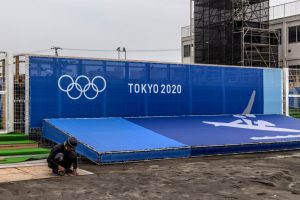Japan is reportedly considering barring all spectators from Olympic events

- Medical experts have said for weeks that no spectators at the global sporting extravaganza that starts on July 23 would be the least risky option.
- Such discussions come after Prime Minister Yoshihide Suga's ruling party failed to win a majority in an election for the Tokyo's assembly on Sunday. The vote was seen as reflecting some voter dissatisfaction over the government's virus response.
- The issue of spectators at Olympic events is due to be decided at five-way talks on Thursday including the Tokyo governor and IOC President Thomas Bach, who arrives in Japan that day.
Japan's government is floating proposals that would ban fans from all events at this month's Olympics, the Mainichi newspaper reported on Wednesday, as officials scramble to address public concerns about the spread of the coronavirus.
Medical experts have said for weeks that no spectators at the global sporting extravaganza that starts on July 23 would be the least risky option.
Organizers have already banned overseas spectators and set a cap on domestic spectators at 50% of capacity, up to 10,000 people, to contain a lingering outbreak of infections.
The Mainichi, citing sources within government, said such discussions were partly the result of political considerations after Prime Minister Yoshihide Suga's ruling party failed to win a majority in an election for the Tokyo's assembly on Sunday. The vote, ahead of a general election later this year, was seen as reflecting some voter dissatisfaction over the government's virus response.
The report further highlights the steep logistical challenges surrounding the Games, which have been dogged by a year of near daily debate about its possible impact on the spread of Covid-19 in Japan.
In response to the Mainichi story, the Tokyo 2020 organizing committee said restrictions on the number of spectators, including non-spectator competitions, will be based on the content of the state of emergency or other relevant measures in force at any time after July 12.
On Thursday, the government is likely to extend a state of quasi-emergency in Tokyo and three nearby prefectures beyond an original end-date of July 11, government sources have said.
Kyodo News reported the extension would likely last a month, meaning the curbs will be in place throughout the Olympics, which close on Aug. 8.
Talks
The issue of spectators at other Olympic events is due to be decided at five-way talks on Thursday including the Tokyo governor and IOC President Thomas Bach, who arrives in Japan that day.
Asked about the issue of spectators at a press conference on Tuesday, top government spokesman Katsunobu Kato said Suga has said holding the Games without spectators was a possibility.
Shigeru Omi, the government's top health adviser, told a parliamentary health committee on Wednesday it was important to reduce the number of Olympic officials and others attending events as much as possible.
Early July to September, which covers the period of the Olympic Games, represents "one of the most important periods" in combating the virus in Japan, he said.
"We have been saying that it's preferable that the events be held without spectators," said Omi. "We are asking many people to take steps to prevent further spread of the infection. Images of spectators would be sending out a contradictory message to a lot of people … In formulating our coronavirus response, people's feelings are a very important factor."
In a another blow to the spectacle of the Games, Tokyo organizers announced on Tuesday they would ask the public not to gather on the streets for the Olympic marathon, one of the most popular and iconic events of the Games.
Tokyo's metropolitan government has also decided to move most of the torch relay, set to reach the capital on Friday, off public roads.
Japan has not experienced the kind of explosive Covid-19 outbreaks seen elsewhere but has seen more than 800,000 cases and 14,800 deaths. A slow rollout has meant only a quarter of its population has had at least one Covid-19 vaccination shot.
Disclosure: CNBC parent NBCUniversal owns NBC Sports and NBC Olympics. NBC Olympics is the U.S. broadcast rights holder to all Summer and Winter Games through 2032
Source: Read Full Article
